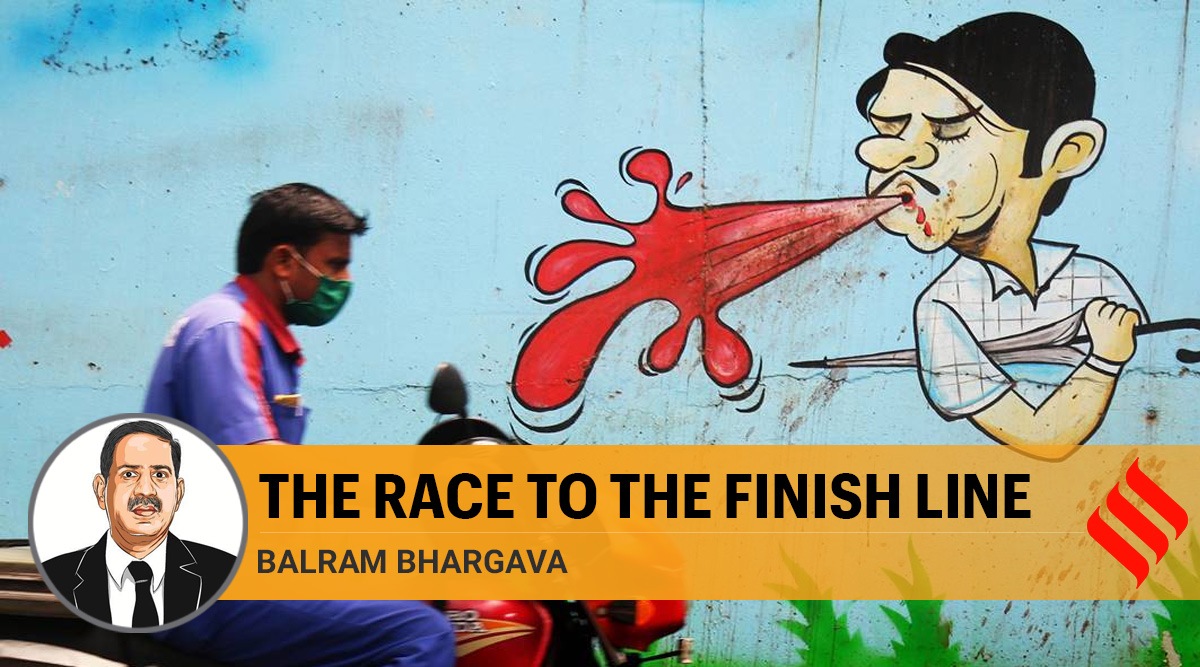 A man drives past a wall painting spreading the message of not spitting in public places. As part of efforts to slow the spread of coronavirus, Maharashtra government has decided to enforce action against all those found spitting in public. (Express Photo by Amit Chakravarty)
A man drives past a wall painting spreading the message of not spitting in public places. As part of efforts to slow the spread of coronavirus, Maharashtra government has decided to enforce action against all those found spitting in public. (Express Photo by Amit Chakravarty)The one question that my family, friends, and peers have constantly asked me as this global public health crisis has unfolded is: When will this pandemic come to an end? Or more precisely, what will it take to end this pandemic. And while the question seems simple enough, unfortunately, there are no easy answers. It is difficult to predict a decisive “end” to a disease that we’re still learning new things about every day. However, one thing that has become abundantly clear through this crisis is that diseases like COVID-19 do not respect borders. It can take only a few months for a health emergency in one country to become a global crisis on a scale we have never seen before. This re-emphasises the point that unless we take everyone along on our race to the finish line, no one is safe.
Collaboration is going to be the cornerstone of a strategy that can potentially end this pandemic. This is true not just at the individual level — where we have to work together to ensure measures like physical distancing and wearing of masks in public places to protect the entire community — but also at the global level where scientists, experts and countries must work together to come up with unique and innovative solutions to help mitigate this crisis.
This is especially true when it comes to the development of a potential vaccine against COVID-19. Scientists worldwide are now working together to develop an effective vaccine that could stop this deadly virus. Thankfully, there has been promising news, and many are hopeful that a vaccine could be well on its way. Globally 42 vaccines are in various phases of clinical trials. In India, there are over three vaccine candidates at advanced stages of development. One of them, the Oxford-AstraZeneca vaccine or ChAdOx1 — in Phase 3 human trial — is supported by the Serum Institute of India. Indigenous vaccines like COVAXIN (developed by Bharat Biotech and ICMR) and ZyCoV-D (developed by Zydus Cadila) are in Phase 2/3 trials.
No matter when and where a vaccine is developed, India is bound to play a pivotal role. This is not surprising since for many years we have been at the forefront of vaccine development and delivery globally. India is one of the largest manufacturers of vaccines in the world in terms of volume. Our vaccines are more often than not more affordable than others in the market. For instance, the indigenous rotavirus vaccines developed by India cost less than a dollar a dose, thus ensuring that more people around the globe have access to these life-saving tools. Approximately 70 per cent of vaccines for low and middle income countries are manufactured in India and delivered through partnerships with UNICEF and Gavi.
Partnerships — such as the Grand Challenges India — are also playing a crucial role in accelerating research, developing new tools, and driving continued progress in tackling the COVID-19 pandemic. Partnerships earlier have led to innovations like the Electronic Vaccine Intelligence Network (eVIN) — an indigenously developed technology, developed in partnership with UNDP, has revolutionised vaccine distribution and supply. Such partnerships have immense potential in delivering a COVID-19 vaccine, not just in India but across the world.
Of course, public health wins are never easy. These innovations and best practices have been built over the years — through multiple experiments and creating a culture that embraces the learning opportunity that failure brings. It took several failures and multiple near-perfect solutions to finally arrive at something that could ease the whole country’s vaccine distribution process. The same principle can be applied to vaccines. While we are hopeful that we will find a solution to the problem called COVID-19, it will undoubtedly take more than just one try to get it right.
Despite the ongoing challenges that the pandemic has thrown up, I am hopeful. Thanks to the groundwork laid in recent years, we have made a lot of progress to streamline research processes and develop novel vaccine platforms. I know that while we are yet to find a conclusive answer to that vital question — what will it take to end this pandemic? — governments, private sector companies, multilateral institutions and civil society organisations are all trying to find a solution. However, there is one conclusive answer for reducing the impact of the next health catastrophe. We need to forge long-term partnerships and increase R&D investments as they will determine the scientific tools at our disposal when faced with future pandemics and other global health emergencies.
This article first appeared in the print edition on October 15, 2020 under the title ‘The Race To The Finish Line’ The writer is secretary, Department of Health Research and Director General, Indian Council of Medical Research
📣 The Indian Express is now on Telegram. Click here to join our channel (@indianexpress) and stay updated with the latest headlines
For all the latest Opinion News, download Indian Express App.